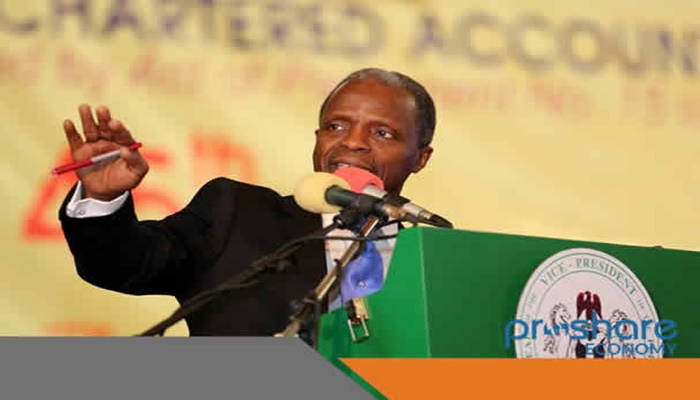Local and international private capital is surest way to fund aviation infrastructure – Osinbajo

***There is no better opportunity than this conference, for a thorough engagement on the whys and wherefores, but more importantly, the practical steps that are required, to ensure that African aviation is not left behind in the growth story of world aviation.
Remarks by the Vice President, Federal Republic of Nigeria, His Excellency, Prof. Yemi Osinbajo, SAN, at the Third Annual International Civil Aviation Organisation (ICAO) World Aviation Forum themed “Financing the Development of Aviation Infrastructure” at Transcorp Hilton Hotel, Abuja, on November 21, 2017.
Protocol
I thank ICAO for the kind invitation to this global gathering of the aviation industry. Nigeria is also honoured to be host to this edition of the forum, especially as we are told that this is the first time that the forum is being held outside the ICAO headquarters. So thank you very much for this special honour.
The central concern of this forum, is Financing the Development of Aviation Infrastructure and we think this is timely and appropriate for two reasons; one is, world aviation is a major economic force and there is no question that its exponential growth in the coming years is guaranteed.
According to the 2017 Aviation Benefits Report, “current forecast indicates that air traffic volumes will double in the next fifteen years, characterised by 4.6% annual growth rate for passenger traffic and 4.4% for trade traffic.
Putting the estimates by the Industry Air Transport Action Group, ATAG, the report notes that the total economic impact, direct and indirect, tourism connected of the global aviation industry reached $2.7trillion and some 3.5% of the world’s GDP in 2014.
The air transport industry also supported a total of 62.7million jobs globally, it provided 9.9million direct jobs, airlines, service providers and airports directly employed over 3million people. The civil aerospace sector, the manufacturers of aircrafts, systems and engines, employed 1.1million people, and a further 5.5million people worked in other airport positions. 52.8million indirect or tourism related jobs were supported by aviation, and these are 2014 figures, and it has been increasing therein.
It is clear therefore, that the critical responsibility of all stakeholders is to see, and to ensure that this phenomenal growth trajectory of the industry is managed and regulated for safety, efficiency, taking into account sustainable environmentally friendly policies and regulations.
More importantly, for our purposes today, we are concerned that in this present and future economic boom, none, especially economically weaker countries, should be left behind.
The only guarantee against this, are forums such as this, which enables stakeholders’ interrogation of the problems of access to capacity and capital for developing economies.
This brings the second reason for the timeliness of this forum; the peculiar challenges of financing aviation infrastructure in Africa. While everyone agrees for example, the growth of aviation in Africa will be good for intra-African trade, African integration and by such, improve the economies of African countries, there is little commitment to financing aviation infrastructure in Africa beyond the mere words.
The evidence is that it is difficult, for aviation stakeholders, and even States to access financing, to build or rehabilitate airports, telecommunications equipment, meteorology infrastructures and cargo warehouses etc.
Indeed and here I quote, a background paper available at this meeting, “there is also no financing agreement to implement the Aviation System Block Upgrades, ASBU, of the global air navigation plan.”
It also appears, as far as Africa is concerned, neither in the Programme for Infrastructural Development for Africa, PIDA, nor in the New Partnership for African Development, NEPAD, is the development of aviation infrastructure given any priority.
There is no better opportunity than this conference, for a thorough engagement on the whys and wherefores, but more importantly, the practical steps that are required, to ensure that African aviation is not left behind in the growth story of world aviation.
The key to achieving this objective is collaboration, and there are several good stories that we in Nigeria can tell about collaboration. The African Development Bank is in discussions with us concerning financing Nigeria’s Aviation Master Plan, which involves among other components, the building of the Maintenance, Repair and Overhaul (MRO) center, and the financing of a private-sector led National Carrier.
ICAO has also committed to supporting the establishment of an Aerospace University in Nigeria, and we began the processes of concessioning some of our major airports. The ultimate objective being to bring in the best in class of investors, and operators to manage and run these facilities.
We believe that local and international private capital is the surest way to fund aviation infrastructure. But we must focus our attention on de-risking private sector investment infrastructure and importantly, reducing the cost of funds that will go towards aviation infrastructure.
I’m sure that somewhere in the course of discussions, some of these issues will be considered and given the attention required to reach some concrete results or suggestions as to how to reduce the cost of funds that go into aviation infrastructure, especially in Africa.
Let me again commend the leadership of ICAO, for bringing the aviation world together here in Abuja, to discuss a subject of profound importance to African economies. I must also commend the honourable Minister of State for Aviation in Nigeria and his team, for the hard work in hosting this event.
Let me invite you to enjoy the sights, sounds and culinary delights of Abuja. On this note, it is my special pleasure and privilege to declare open the ICAO World Aviation Forum – Financing the Development of Aviation Infrastructure.
Thank you.






